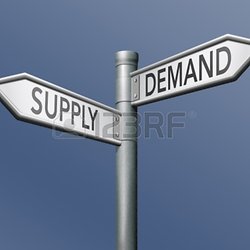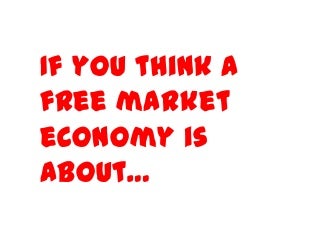 National Earnings is the whole economic activity (production of finished goods and companies calculated in monetary value) throughout the economic territory of a country by its residents in the course of the 12 months of accounting. The value judgements of these folks, as well as the actions that arise from these appreciations are forces that determine the (continually changing) obtainable in the marketplace. The market is the point where converge the performances of people and, at the time, the Heart where originate. This second system is sometimes called socialism, communism, planned economic system or state capitalism. The economic system of market or pure capitalism, as it’s also usually known as, and the socialist economic system are antithetical terms. The production is directed by the market or it is ordered by the mandates of the dictatorial authority, either one-particular person or collegial. The State or municipalities possess and administer certain holdings never tarnish the everyday traits of the market economic system.
National Earnings is the whole economic activity (production of finished goods and companies calculated in monetary value) throughout the economic territory of a country by its residents in the course of the 12 months of accounting. The value judgements of these folks, as well as the actions that arise from these appreciations are forces that determine the (continually changing) obtainable in the marketplace. The market is the point where converge the performances of people and, at the time, the Heart where originate. This second system is sometimes called socialism, communism, planned economic system or state capitalism. The economic system of market or pure capitalism, as it’s also usually known as, and the socialist economic system are antithetical terms. The production is directed by the market or it is ordered by the mandates of the dictatorial authority, either one-particular person or collegial. The State or municipalities possess and administer certain holdings never tarnish the everyday traits of the market economic system.
These firms, owned and managed by public power, are subject as non-public to the sovereignty of the market. The Administration can compensate their losses with State funds, nevertheless it neither suppresses nor mitigates the supremacy of the market. As a result of the funds masking those losses must be raised by way of taxes and the implications which such taxation will lead to society and in the economic structure are at all times those supplied for by the legislation of the market. It is the operation of the market – and not the State to lift taxes-that decides on who will fall the tax burden at the end and what will be the effects of this on production. It’s not a State Office, who will determine the functioning of public enterprises and the market.
It is a model that varieties the premise of the actual framework during which operate the economies of many international locations at present. Government’s function in a free-market economic system also contains protecting non-public property, imposing contracts, and regulating certain economic activities. Examples embody laws that limit youngster labor, prohibit toxic emissions, or forbid the sale of unsafe goods. Proponents of free-market economies imagine they provide an a variety of benefits. In communism, the government plans the economic system and all means of production are publicly owned.
Opponents imagine that a free-market economic system can not ensure fundamental social values, corresponding to alleviating poverty, or that the earnings distribution that results from a free-market economic system will not be equitable. A free-market economic system may permit the accumulation of vast wealth and powerful vested interests that might threaten the survival of political freedom. The economic system of the former Union of Soviet Socialist Republics was an example of a planned economic system: all choices concerning production and distribution had been made by the government. In contrast, a blended economic system is one where the government does some planning and owns or controls more industries than in a free-market economic system.
A free market does not require the existence of competition, nonetheless it does require that there aren’t any limitations to new market entrants. Hence, in the lack of coercive limitations it is typically understood that competition prospers in a free market setting. It usually suggests the presence of the profit motive , although neither a profit motive or profit itself are essential for a free market. Definition: A market economic system is an economic system where customers determine what is produced, sources are allocated by value mechanism and land and capital are privately owned. Definition: A blended economic system is an economic system during which both the non-public and public sectors play an necessary function. A free market is a market during which there isn’t any economic intervention and regulation by the state , except to enforce non-public contracts and the ownership of property. There are likelihood of shedding local/national products’ demand and job market.
